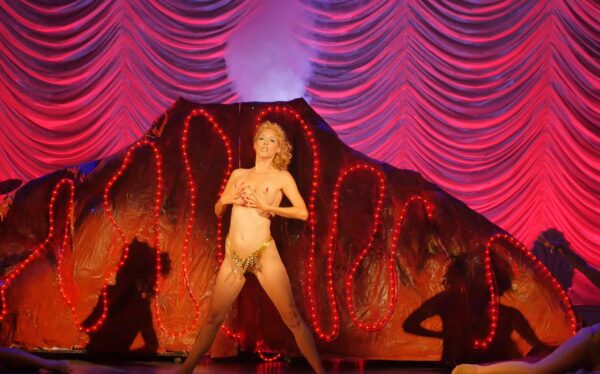YOU DON’T NOMI
(director/writer: Jeffrey McHale; editor: Jeffrey McHale; music: Mark degli Antoni; cast: Adam Nayman, April Kidwell, Barbara Shulgasser-Parker, David Schmader, Haley Mlotek, Jeffrey Conway, Jeffrey Sconce, Matt Baume, Peaches Christ, Susan Wloszczyna; Runtime: 92; MPAA Rating: NR; producer: Jeffrey McHale, Ariana Garfinkel, Suzanne Zionts; RLJE Films; 2019)
“Revisits the much maligned stripper film of Paul Verhoeven’s 1995 Showgirls.”
Reviewed by Dennis Schwartz
Jeffrey McHale in his debut doc (a film named after the Nomi character of Elizabeth Berkley) revisits the much maligned stripper film of Paul Verhoeven’s 1995 Showgirls and says the critics and viewers calling it a bomb at the time got it wrong, that the film which in recent times has become a cult classic might even be a masterpiece (an opinion which I find laughable).
Showgirls was the most panned film of the nineties. It tarnished Verhoeven’s solid rep as a filmmaker (a rep earned at least in his Dutch films) and put a damper on the career of its star, Elizabeth Berkley, that she’s still trying to fully overcome after shattering her former squeaky clean image.
The film is a rags to riches story of a nobody trying to become a somebody. It tells of a traumatic childhood for Berkley’s Nomi, who thumbs her way to Vegas and from there uses her sex appeal to get the empowerment she’s always been denied. Her goal is to advance from the lapdance circuit to star as a Vegas showgirl and do it by dethroning the gambling mecca’s queen, Cristal Connors (Gina Gershon).
The film’s excessive sexual sleaze confused its mainstream audience, who would cringe more than laugh at its absurdities (when the filmmaker wanted them to laugh). Though the queer viewers took to the film’s over-the-top sexual aggressiveness, its shocking scenes and its camp. They voiced approval of this messy sex film and could understand the star’s career motivations and laugh at its excesses. There were only a few critics at the time who found the audacious film to their liking. But patrons stayed away and the film tanked where it counts the most for most studios–at the box office.
The Dutch filmmaker Verhoeven (“Spetters”/”The Fourth Man”) has defended the film by saying it was meant to be a satire. Screenwriter Joe Eszterhas seems sincere when telling us the film was about finding moral values in Sin City, even though his script is trashy and he seems to be talking nonsense when trying to give the film a higher purpose. But when both artists claim they were using their voice against Hollywood’s hypocrisy over its usual sex appeal films, they got my attention. I think it has found its right niche as a cult classic, as I would agree with others who would put it in the same camp category as Valley of the Dolls and Mommie Dearest–bad films that are entertaining.
McHale’s doc is fun viewing and gives us a chance to see how critics evaluate a film, as through film clips we look back at the NC-17 rated film, the winner of the Razzies as the worst film of the decade. But McHale’s thoughtful attempt is not necessarily to elevate this film into elite company but show us how we attack certain content because of who we are. It makes me want to see it again (perhaps on some rainy day), since I was one of the critics who panned it on its release and feel I might have gotten it wrong.

REVIEWED ON 6/13/2020 GRADE: B